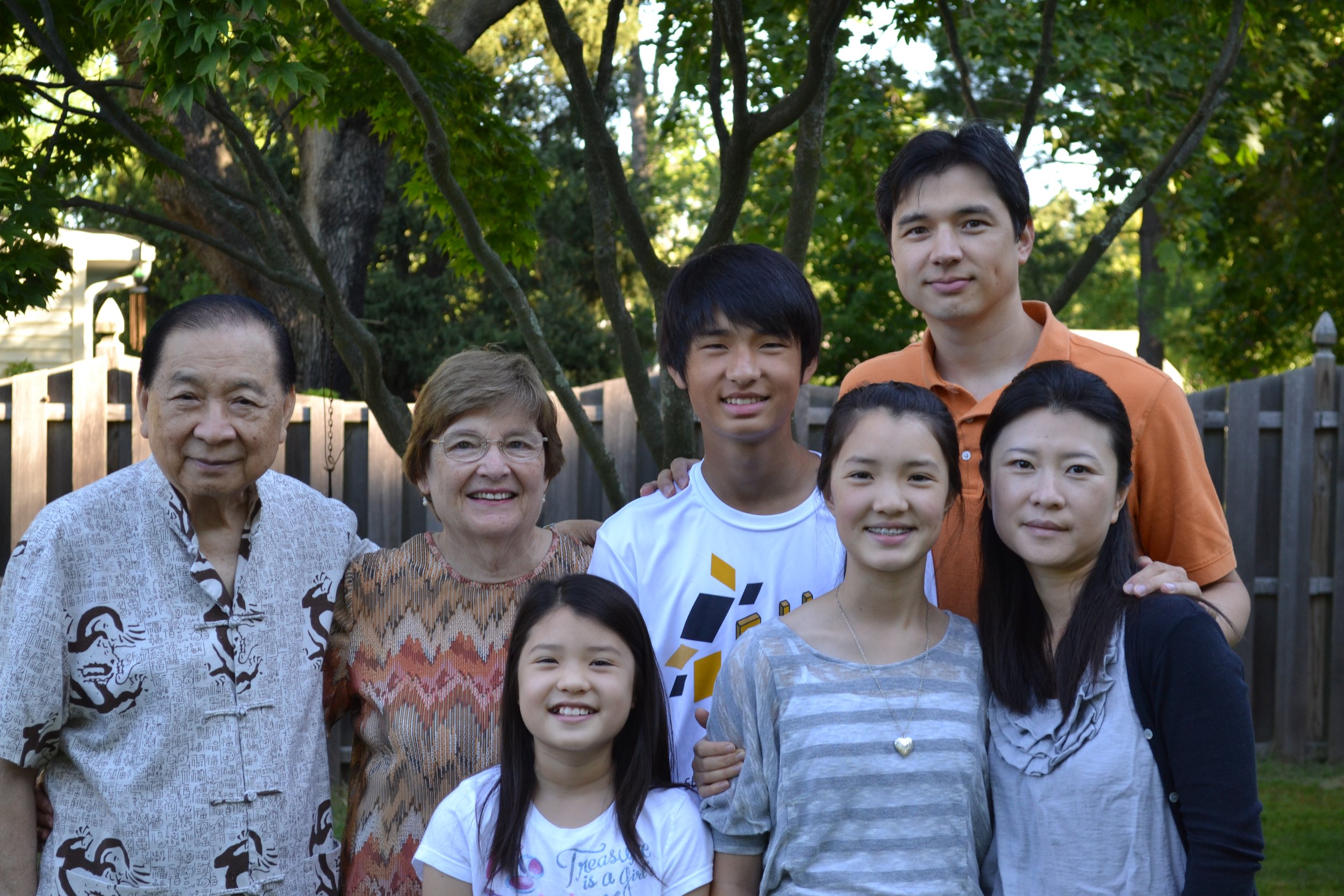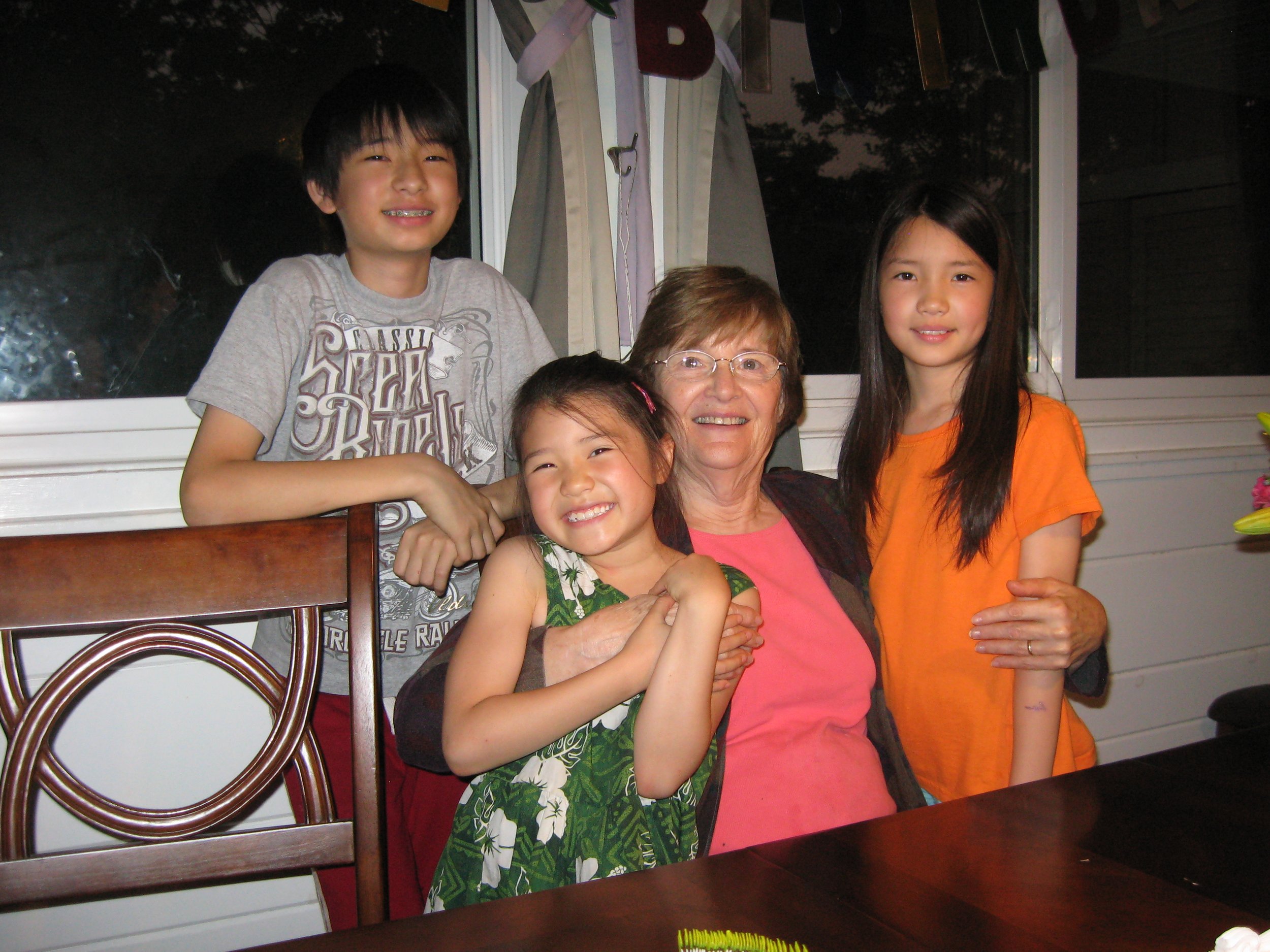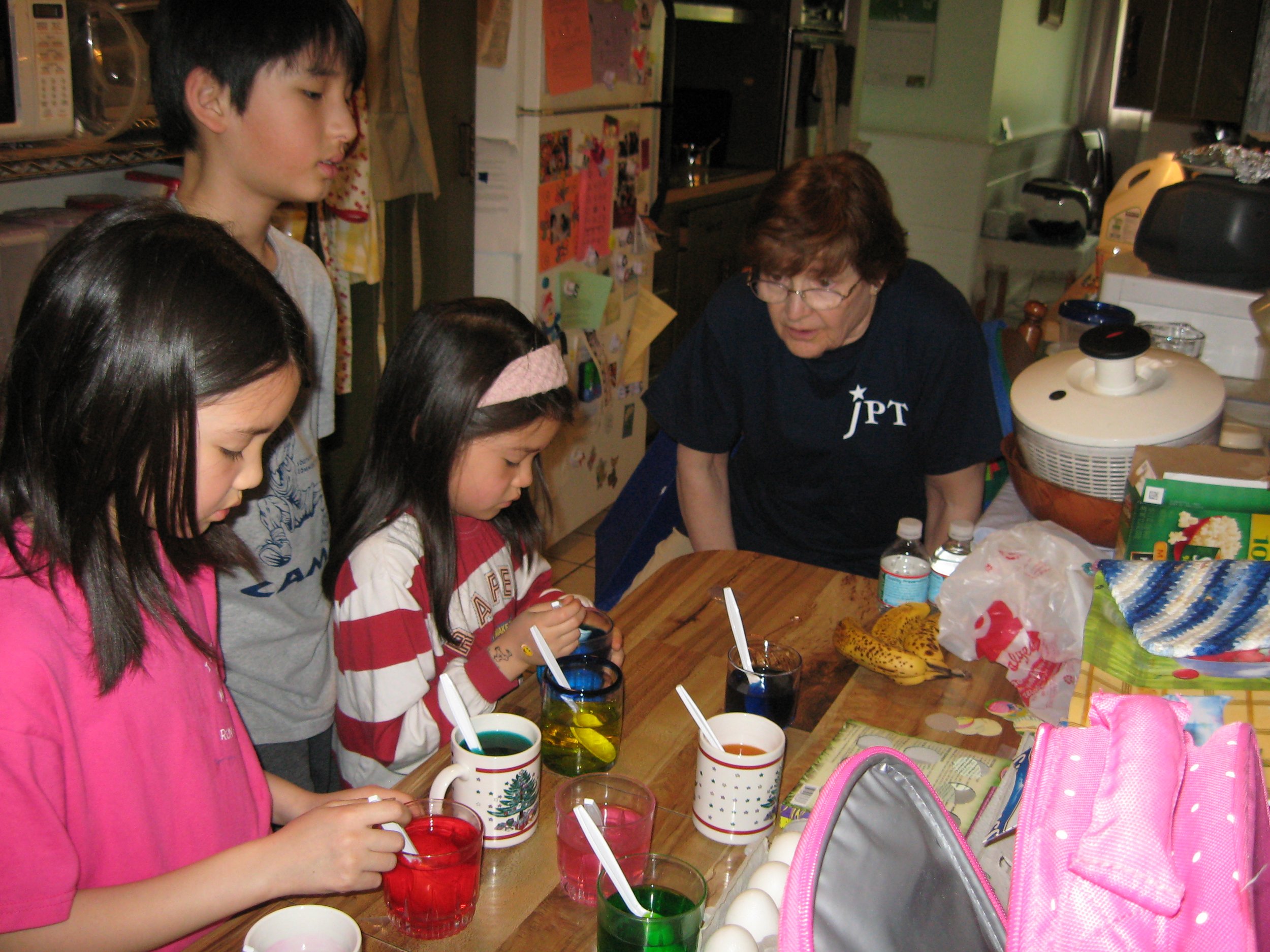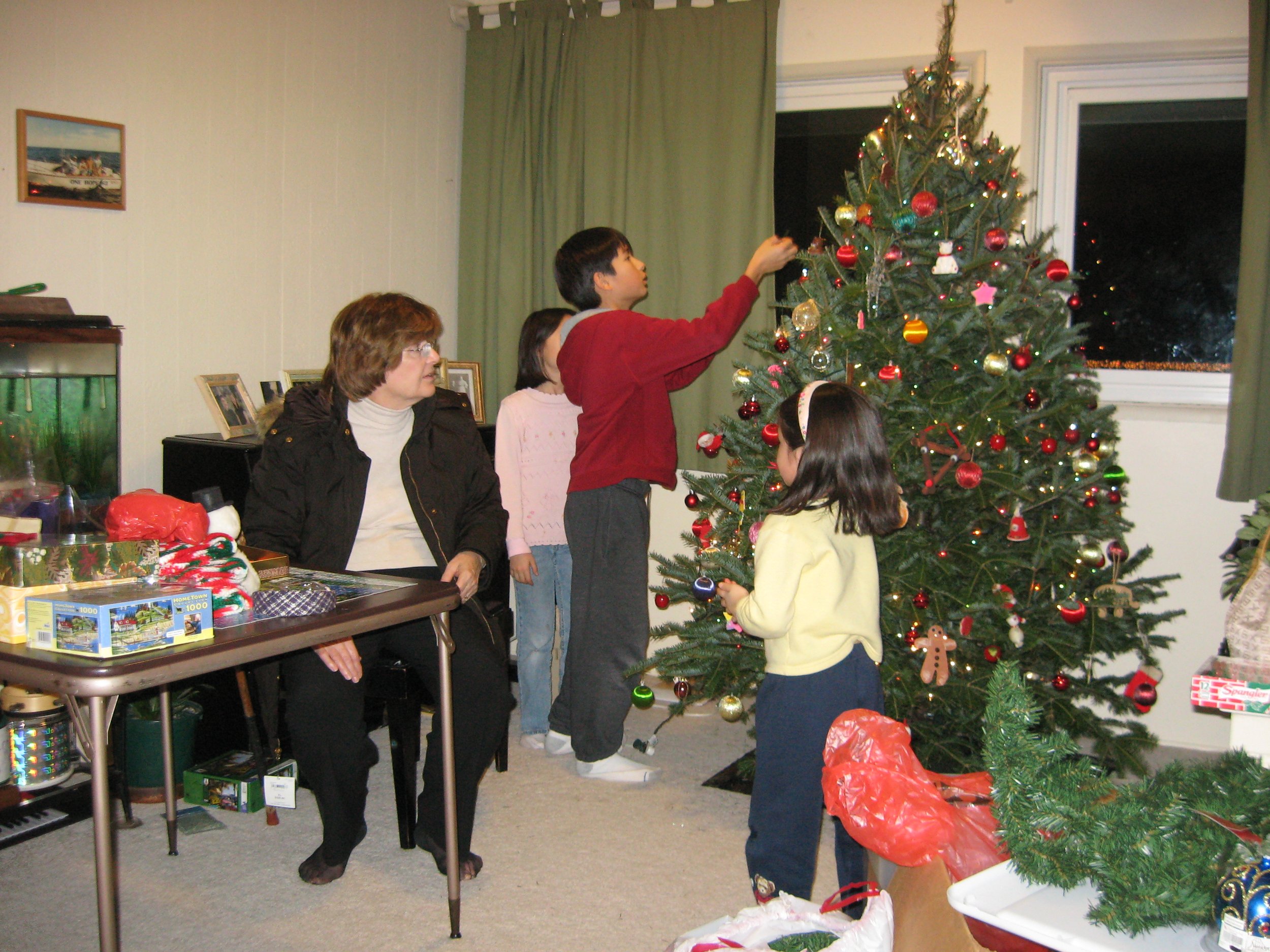A Three Generational House
By Marie Ang
In 2003, when my husband and I were in our late 60s and 70s, we moved from Kingston, New York to central New Jersey to live with our son Dohi, his wife Jin Hee, and their two young children at the time. I had been working as secretary to the principal at a Vo-tec high school long enough to retire with a small pension, but it was hardly enough to buy groceries. So we had an important decision to make. We, like most grandparents, desired to be closer to our grandchildren. Knowing how eager Jin Hee was to continue her college education, we wanted to be close enough to their family to be able to help them with the children.
After finding a four-bedroom ranch style house that seemed suitable, Dohi and Jin Hee invited Edwin and me to move in with them. This felt like the right direction to take, as this is what our True Parents had been teaching and promoting: three generations living together. So we made the move.
We have learned a lot during these past 21 years of the “Do’s and Don’ts” of living together as a three-generational family. It is surely not always easy to make things go smoothly. There was a time when we wondered if we could make it work. But somehow we have survived, thanks in large part to honest communication, some adjustments along the way, and big doses of compromise and patience.
I have often thought that the ideal situation for three-generation family living would be similar to what the Amish do. In their tradition, they have something called a Dawdy Haus (Dutch for “Grandparents’ House”), which is a small house with its own little kitchen, built next to the main house.
Eight years ago, after we had already been living together for some time, Dohi and Jin Hee were able to build an addition onto their house, which gave Edwin and me our own separate outdoor entrance to a large room that serves as both a bedroom and living room. We now had a walk-in closet and our own small bathroom. Edwin had his own little office elsewhere in the house, which was important to him. The separate entrance to our bedroom really gave us the feeling of having our own little home, our own “Dawdy Haus”!
In many cultures, multiple generations living together is the norm. It’s interesting to note that according to the Pew Research Center, the number of three-generational families here in the United States has quadrupled from 1971 to 2021. The number one reason for this is for the financial benefit. But according to research on multigenerational living, there are other important advantages for three generations living together.And yet, in order to make it work, there are some important conditions that need to be present.
What are some things to be aware of when living as a three-generation family? As a matter of fact, there are some key attitudes that are essential, whether you are living together or not. But they become especially important when seeing each other on a day-to-day basis, and they become crucial to maintain healthy relationships and a happy home.
For instance:
Respecting and being sensitive to the privacy of others. Everyone needs their space and that needs to be respected.
For example, knocking when doors are closed; letting the grandparents and parents occupy different sides of the home; etc. I read in an article that the two bedrooms -- of the grandparents and the parents -- should not be next to each other, but instead be in separate parts of the house. This helps to give everyone a little bit of “breathing space” and privacy.
Respecting parenting differences. Sometimes there are cultural differences or different styles in how to raise children. For example, we can hear about tiger parenting or free-range parenting, etc. But ultimately this is the parents’ role and we as grandparents have already had that experience. Now it’s their turn.
Responsibilities. Whose responsibility is it to mow the lawn, to take care of the recycling, for the cooking schedule, etc.? For me, it was quite an adjustment not to have my own kitchen, but we managed to work out schedules in the kitchen that seemed to work.
Financial responsibilities. It is important to put this on the table from the very beginning, so that everyone is on the same page. Will the grandparents contribute rent or not? How about utilities that one party uses but the other does not?
The most important part here is not the details, but the general attitude of appreciation and contribution. For example, in our family, sometimes our couple would do little things here and there to support our children. I believe that these little gestures showed that we didn’t take everything for granted and that we expressed our appreciation to them.
This leads to the final and most important point: The importance of good communication. Keeping open communication, in a respectful and kind manner, is the key to living together well.
The ‘respectful and kind manner’ is also important. My son’s couple has always regularly expressed appreciation for the little things we did around the house. It just helps to add to a positive atmosphere and relationship over time.
What are the benefits? How have our grandchildren benefitted from having grandparents around on a daily basis?
You would really have to ask them. But from our -- the grandparents’ --point of view, I believe we have been a source of stability for them. We were almost always there while they were growing up, when their parents were busy working long hours or busy studying.
When they were young, most of the time I drove them to preschool and picked them up. During the elementary school years, Edwin and I enjoyed walking them to school and back every day, which gave us one-on-one time with them (and a little exercise, too). Many times, when their parents were working (Dohi and Jin Hee at times were working long hours), I enjoyed making afterschool snacks for them, or picking them up from afterschool activities. Through all of these experiences, we developed a close relationship with them that has left us with such precious memories.
We have tried to stimulate their interests, encouraging and supporting them in a variety of ways, whether it is supporting their musical interests, attending their concerts, or helping them study for tests, learn multiplication facts, or study spelling words. We were always around to help them.
In a natural way, they learned something of our history -- through conversations around the dinner table or photos/stories of our childhood and of our ancestors that were easily shared.
And we were always there to listen when they were upset about something. Or if they had a nightmare or couldn’t sleep, sometimes they would come to our room. We were always there to comfort and listen. They also said that they have learned to understand elderly people more – such as what they’re going through as they grow older -- which gives them greater empathy for elder people.
How do grandparents benefit from living with their grandchildren?
It has been such a joy being around them and seeing them grow up, as they’re learning new skills and maturing as their understanding of life broadens. A deep bond of love is there that is something special. And as the years go by, Edwin and I have been able to see the issues they have to deal with, on a daily basis, especially through the teen years. It helps us have a deeper understanding of their actions and how they are learning to cope in preparing for the future. But most of all, what we have gained is the deep bond of love that we have established with them.
Living with three generations together takes sacrifice on everyone’s part. Many families feel the need to be more independent from the grandparents. And there are, of course, all kinds of aspects of shared living that might discourage living together. But there is value for both the parents and grandchildren if the grandparents can at least live close enough so that a deep bond of love is felt. And that is our heart’s desire.
What is the tradition that grandparents should hand down to their grandchildren?
In our faith community, I would say most, if not all grandparents would like to see their grandchildren carry on the faith traditions that have meant so much to them. We leave this responsibility primarily with their parents: our role as grandparents now is to support our children’s efforts. Our indirect influence comes through how we live our own lives, showing what is important to us, and relating stories of our own experiences in our life of faith, in a very natural way.
For us, living together with Dohi and Jin Hee and their family has been a real blessing for Edwin and me, and now, especially for me since Edwin’s passing. They have seen us deal with aging and offer suggestions and comments that make us really feel cared for.
How does a couple benefit from living with both their parents & children?
Answered by Dohi Ang:
For us, a big benefit has come in terms of faith. Our kids are able to see their grandparents living their faith in a consistent and natural way, and in a way that is slightly different from how our couple practices our faith. I think this gives them a sense of confidence that faith is not just something from their parents and that it’s not this weird thing, but that it’s something meaningful that can be practiced in slightly different forms.
My parents always engaged in Hoondokhae and prayer and were committed to attending church every Sunday. This was especially important during the very busy phase of our family life, when it wasn’t easy for us to have consistency, especially since the church is far away from our home.
More practically speaking, it was helpful to have grandparents’ assistance especially when the kids were younger.
But, as the parents, living together also meant that my couple became a lot closer with my parents. It’s very different from occasional visits, so the relationship tends to be a bit closer and more intimate than it would be otherwise.
Living together also lets me take care of my parents when needs arise, and it lets me know that I’m playing my role as a filial son, which is a value I was raised with and a value I do actually care about.







